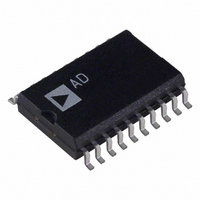AD598JRZ Analog Devices Inc, AD598JRZ Datasheet

AD598JRZ
Specifications of AD598JRZ
Available stocks
Related parts for AD598JRZ
AD598JRZ Summary of contents
Page 1
FEATURES Single Chip Solution, Contains Internal Oscillator and Voltage Reference No Adjustments Required Insensitive to Transducer Null Voltage Insensitive to Primary to Secondary Phase Shifts DC Output Proportional to Position kHz Frequency Range Single or ...
Page 2
AD598–SPECIFICATIONS Parameter 1 TRANSFER FUNCTION 2 OVERALL ERROR MIN MAX SIGNAL OUTPUT CHARACTERISTICS Output Voltage Range ( MIN MAX Output Current ( MIN MAX Short Circuit Current 3 Nonlinearity ( ...
Page 3
NOTES 1 V and V represent the Mean Average Deviation (MAD) of the detected sine waves. Note that for this Transfer Function to linearly represent positive displacement the sum of V and V of the LVDT must remain ...
Page 4
AD598–Typical Characteristics 40 OFFSET PSRR 12–15V 0 OFFSET PSRR 15–18V –40 GAIN PSRR 12–15V –80 –120 GAIN PSRR 15–18V –160 –200 –240 –60 – TEMPERATURE – C Figure 1. Gain and Offset PSRR vs. Temperature 5 0 ...
Page 5
This technique uses the pri- mary excitation voltage as a phase reference to determine the polarity of the output voltage. There are a number of problems associated with this technique such as (1) producing a ...
Page 6
AD598 DESIGN PROCEDURE DUAL SUPPLY OPERATION Figure 7 shows the connection method with dual 15 volt power supplies and a Schaevitz E100 LVDT. This design procedure can be used to select component values for other LVDTs as well. The procedure ...
Page 7
C2, C3 and C4 are a function of the desired bandwidth of the AD598 position measurement subsystem. They should be nominally equal values. – Farad Hz/f If the desired system bandwidth is ...
Page 8
AD598 13. Load current through R returns to the junction of R5 and L R6, and flows back Under maximum load condi- PS tions, make sure the voltage drop across R5 is met as defined in Step ...
Page 9
Figure 15. Gain and Phase Characteristics vs. Frequency (0 kHz–10 kHz) 1000 100 10 1 0.1 0.01 0.1 C2, C3, C4 – F Figure 16. Output Voltage Ripple vs. Filter Capacitance REV. A 1000 100 ...
Page 10
AD598–Applications PROVING RING-WEIGH SCALE Figure 20 shows an elastic member (steel proving ring) com- bined with an LVDT to provide a means of measuring very small loads. Figure 19 shows the electrical circuit details. The advantage of using a Proving ...
Page 11
MASTER – – OFFSET 1 19 EXC 1 OFFSET EXC LEV 1 SIG REF 82. LEV 2 SIG OUT 0.015 FEEDBACK ...
Page 12
AD598 The V/F converter is currently set up for unipolar operation. The AD652 data sheet explains how to set up for bipolar opera- tion. Note that when the LVDT core is centered, the output fre- quency is zero. When the ...
Page 13
OUTPUT MECHANICAL POSITION SCHAEVITZ E 100 LVDT 0.015 F 0.1 F INPUT MECHANICAL POSITION SCHAEVITZ E 100 LVDT 0.015 F 0 LVDT 1 SCHAEVITZ E 100 C D LVDT 2 SCHAEVITZ E 100 REV. A MASS ON ...
Page 14
AD598 PRECISION DIFFERENTIAL GAGING The circuit shown in Figure 26 is functionally similar to the dif- ferential gaging circuit shown in Figure 25. In contrast to Figure 25, it provides a means of independently adjusting the scale fac- tor of ...
Page 15
OPERATION WITH A HALF-BRIDGE TRANSDUCER Although the AD598 is not intended for use with a half-bridge type transducer, it may be made to function with degraded performance. A half-bridge type transducer is a popular transducer. It works in a similar ...
Page 16
AD598 OUTLINE DIMENSIONS Dimensions shown in inches and (mm). 20-Pin Sized Brazed Ceramic DIP 20-Lead Wide Body Plastic SOIC (R) Package –16– REV. A ...













